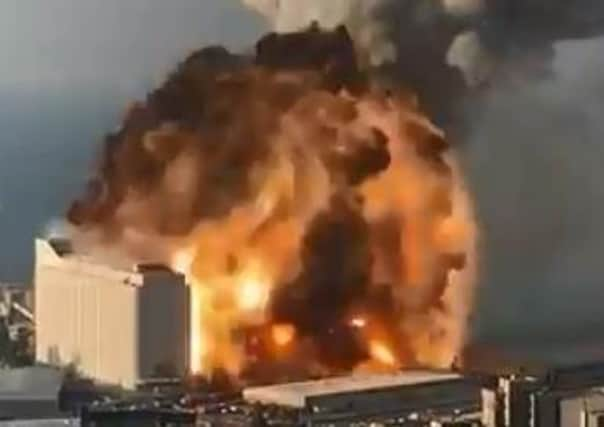Beirut disaster: Expert’s take on Hezbollah and ammonium nitrate bombs, plus group’s IRA links


Philip Ingram, a former Colonel in army intelligence and an expert in chemical, biological, radiological and nuclear warfare, was speaking after the catastrophic detonation of 2,750 tonnes of fertiliser in Beirut killing at least 135 people and injuring around 5,000 others.
Ammonium nitrate is used as an agricultural fertiliser and as an explosive. The IRA widely used it for bombs since the 1970s and for three massive attacks in London in the 1990s.
Advertisement
Hide AdAdvertisement
Hide AdHowever, despite Lebanon’s own troubled past and current political instability, Mr Ingram is fairly certain reports of this week’s explosion being a tragic accident are accurate.
Although ammonium nitrate is still used for terror purposes today in Pakistan, Afghanistan, Syria and Iraq, he says there is no known terrorist link to the chemicals which exploded in Beirut.
Rather he understands they were seized in 2016 by Lebanon in a dispute over an outstanding shipping debt.
“On the balance of probabilities I would say that the explosion was a tragic accident.”
Advertisement
Hide AdAdvertisement
Hide AdThe huge haul was probably not stored in ideal conditions, allowing it to dangerously degrade, he adds. This, combined with fireworks being stored nearby and a localised fire were probably the triggers for the tragedy, he says.
In the wake of the disaster, there has been increasing speculation on social media that the ammonium nitrate was a Hezbollah explosives stockpile.
Hezbollah is a Lebanese political party, and is classed by the US as a terror group.
Supporters of the theory that the explosion was terror related say Beirut is a Hezbollah controlled port and that it had been well known as being used to store Hezbollah weapon hauls.
Advertisement
Hide AdAdvertisement
Hide AdThe Jerusalem Post reported today that huge Hezbollah-linked stockpiles of the same chemicals have been seized in London and Germany in recent times.
Mr Ingram accepted that at the very least Hezbollah would be aware of the stockpile in Beirut and its military potential.
However he did not believe it had a terrorist origin or purpose.
“Hezbollah did and do control the port but one thing there is no shortage of in the Middle East is military grade explosives so there is no point making home made explosives if you can get the proper stuff,” he said.
Advertisement
Hide AdAdvertisement
Hide Ad“They will have known its potential but it is likely they were wrangling with the government over payment for storage and who would get profit from its onward sale. I would suggest corruption probably had a greater impact in this situation that potential terrorist use.
“We have to see Hezbollah as bigger than just a terrorist group - it is a mini-separate government with its military wing being its terror organisation. About 40% of Lebanon is Hezbollah supporting and 60% non Hezbollah supporting.”
While there have been many reports of the IRA exporting its terror expertise internationally, for example to FARC in Colombia and to insurgents in the Middle East, on this occasion it was not the Irish terror group which trained Lebanese groups in fertiliser bombs, Mr Ingram said.
“It was actually the other way round,” the Northern Ireland man said. “Hezbollah will likely have trained the IRA in making fertiliser bombs - they have trained many different organisations.”
He says the group trained the IRA in the 1980s.
Advertisement
Hide AdAdvertisement
Hide AdFormer IRA commander Brian Keenan cultivated links in Lebanon for arms smuggling, and the late Sinn Fein official Denis Donaldson is reported to have visited Lebanon several times in the 1980s, on at least one occasion for a training camp.
The Jerusalem Post reports that by 1987, IRA contact with Hezbollah led to the development of new tactics such as “diversionary” mine attacks used with deadly effect in south Lebanon and at Warrenpoint in 1979, where 15 British soldiers were killed. From the early 1970s, Palestinian group Fatah also organized arms and terrorist training for IRA and INLA operatives in Lebanon and Libya.
A message from the Editor:
Thank you for reading this story on our website. While I have your attention, I also have an important request to make of you.
With the coronavirus lockdown having a major impact on many of our advertisers - and consequently the revenue we receive - we are more reliant than ever on you taking out a digital subscription.
Advertisement
Hide AdAdvertisement
Hide AdSubscribe to newsletter.co.uk and enjoy unlimited access to the best Northern Ireland and UK news and information online and on our app. With a digital subscription, you can read more than 5 articles, see fewer ads, enjoy faster load times, and get access to exclusive newsletters and content. Visit https://www.newsletter.co.uk/subscriptions now to sign up.
Our journalism costs money and we rely on advertising, print and digital revenues to help to support them. By supporting us, we are able to support you in providing trusted, fact-checked content for this website.
Alistair Bushe
Editor